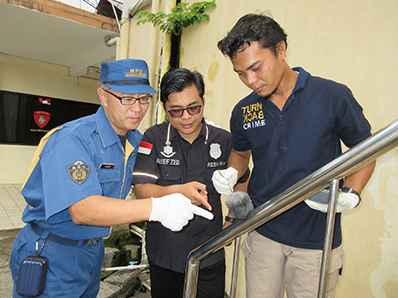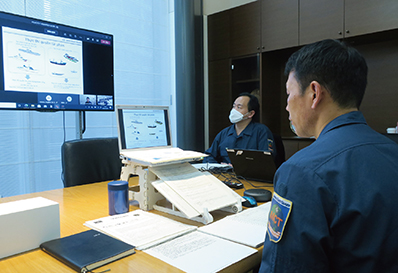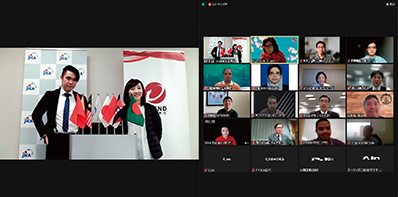(3) Assistance for Stability and Security
Transnational organized crime and acts of terrorism continue to pose a threat to the entire global community. Effective response to these threats cannot be achieved by the efforts of a single nation alone. Therefore, in addition to strengthening countermeasures by individual nations, the entire international community must work together through assistance to build capacity in the fields of justice and law enforcement in developing countries.
● Japan’s Efforts
A. Enhancing the Capabilities of Security Authorities

Japanese experts providing instruction to Indonesian officials on how to collect fingerprints onsite under the technical cooperation “Project on Nationwide Capacity Development of Police Officers for POLMAS-Indonesian Civilian Police Activities” in Indonesia (Photo: JICA)
Based on the track records and experiences of the Japanese police in international cooperation, they provide support for the creation of systems, improvement of administrative capabilities, and human resources development while transferring knowledge and skills to police agencies in developing countries, who play a key role in maintaining security.
As one of the examples, the National Police Agency (NPA) of Japan dispatched experts to Indonesia, and also provided online training for the officials of Asian, African and Oceanian countries, showing how police are trusted by the people in Japan.
B. Counter-Terrorism
The environment surrounding terrorism has changed greatly due to the spread of COVID-19. Although the restrictions on movement due to the pandemic have reduced terrorism in urban areas, in some areas where the governing capacity of the nation is vulnerable, the pandemic has further degraded governance and helped expand terrorist organizations’ activities.
In 2021, Japan implemented various projects through international organizations in order to promptly respond to changes in the environment surrounding terrorism. For example, in the Maldives, Japan assisted in the response capacity program and educational support against violent extremism for youth and women in partnership with the UNDP. In addition, with UN Women, Japan supported a program to strengthen social integration, including the empowerment of women leaders in the Philippines and other countries. Moreover, Japan provided assistance through the Council of Europe, and strengthened the prosecution capacity of judicial officials to address crimes committed in cyberspace, which have increased during the COVID-19 pandemic.
In addition to the above, in FY2021, Japan provided $570,000 for a program of UN Women in Thailand and Bangladesh to prevent violent extremism and hate speech and to promote women’s participation in peace and security through dialogue. Japan also contributed $700,000 to UNODC’s project addressing overcrowding in prisons by promoting rehabilitation, social reintegration, and social treatment in seven countries in Southeast and South Asia.
C. Measures against Transnational Organized Crime
Japan, as a state party to the United Nations Convention against Transnational Organized Crime (UNTOC), a legal framework for preventing transnational organized crime including terrorism, is promoting international cooperation that includes mutual legal assistance based on the Convention. Additionally, Japan mainly provides the following international cooperation.
■ Countermeasures against Drug Trafficking
While actively participating in the relevant international conferences and fora such as the Commission on Narcotic Drugs (CND), Japan has been working on the world drug problem through financial contributions to the UNODC in 2021 for technical cooperation to strengthen drug control capabilities at national borders and to promote alternative crops development for the people involved in or affected by illicit drug production.
In addition, the NPA of Japan holds discussions on the regional drug situation and relevant investigational measures as well as on the way of international cooperation with countries mainly in the Asia-Pacific region in order to build mutually beneficial cooperative structures for collectively working on the world drug problem.
■ Measures against Trafficking in Persons
Based on the “Protocol to Prevent, Suppress and Punish Trafficking in Persons Especially Women and Children,” a comprehensive international agreement concerning trafficking in persons, Note 33 and Japan’s “2014 Action Plan to Combat Trafficking in Persons,” Japan is engaged in various efforts to eradicate trafficking in persons. Under this Action Plan, the Government of Japan has released annual reports on its efforts to combat trafficking in persons, while also strengthening cooperation with various ministries, agencies, relevant organizations, and NGOs.
In 2021, Japan provided support to victims of trafficking in persons identified in Japan through contribution to IOM, towards their safe repatriation to their respective home countries, and provided education and vocational training for their independence and social rehabilitation (see also “Stories from the Field 8”). Additionally, through bilateral technical cooperation and financial contributions to UN projects delivered by UNODC and UN Women, Japan also supported measures against trafficking in persons and made efforts to protect victims mainly in Southeast Asia. Japan also made financial contributions and participated in the Bali Process, an Asia-Pacific regional framework against people smuggling, trafficking in persons, and related transnational crime.
■ Measures against Money Laundering
There is a high risk for the profits of transnational organized crime to be used to fund further organized crime or acts of terrorism, and thus, eliminating such flows of illicit funds is an important task for the international community. Therefore, Japan actively participates in discussions on international measures against money laundering Note 34 and terrorist financing through intergovernmental frameworks such as the Financial Action Task Force (FATF). Note 35
D. Capacity Building for Maritime, Outer Space, and Cyberspace Issues
■ The Seas

Japan Coast Guard officials in charge of maritime security capacity building in Japan providing a lecture regarding on-board inspections to Vietnam Coast Guard officials (Photo: Japan Coast Guard)
As a maritime nation, Japan depends largely on maritime transport for the import of much of its energy resources and food, therefore ensuring marine traffic safety, such as by addressing maritime threats, is an issue that directly links to Japan’s existence and prosperity as a nation. Moreover, an open and free international order of the seas based on the rule of law is extremely important not only for realization of the “Free and Open Indo-Pacific (FOIP)” promoted by Japan but also for the economic development of the entire region including Japan (see “ODA Topics 2” regarding initiatives for the realization of a “Free and Open Indo-Pacific (FOIP)”).
In order to establish and promote the rule of law at sea, Japan seamlessly supports the improvement of law enforcement capacity of maritime security agencies in the Indo-Pacific region through the provision of patrol vessels and technical cooperation, while promoting cooperation for capacity building in Maritime Domain Awareness (MDA) among recipient countries. Specifically, Japan is carrying out human resources development through training and the dispatch of experts for maritime countries along sea lanes including Indonesia and Malaysia, in addition to providing vessels and maritime security-related equipment to Viet Nam, the Philippines, and other countries. Moreover, at the 12th Mekong-Japan Summit held in November 2020, then Prime Minister Suga announced that Japan would provide an information-gathering web portal as well as human resources development for MDA capacity building in the Mekong countries as one of the “Five Points of Cooperation,” and Japan steadily implements these supports.
As an effort to promote regional cooperation in countering piracy and armed robbery against ships in the Asia region, Japan has led the formulation of the Regional Cooperation Agreement on Combating Piracy and Armed Robbery against Ships in Asia (ReCAAP), and supports the activities of ReCAAP-ISC, an information sharing center established based on the ReCAAP. Japan has played a leading role in organizing comprehensive training together with ReCAAP-ISC since 2017, aiming for capacity building of the maritime law enforcement agencies of contracting parties, among others. 23 countries participated in the training in 2021 that was held online due to COVID-19.
In order to counter the threat of piracy off the coast of Somalia and in the Gulf of Aden in Eastern Africa, Japan has been conducting anti-piracy operations since 2009. Moreover, Japan has contributed a total of $15.53 million to the Djibouti Code of Conduct Trust Fund, which was founded by the International Maritime Organization (IMO) to implement the Djibouti Code of Conduct. Note 36 This Trust Fund has been used to establish information-sharing centers for anti-piracy measures and the Djibouti Regional Training Centre, which conducts training programs to improve maritime security capabilities in countries surrounding Somalia.
Also, in cooperation with the Japan Coast Guard, maritime law enforcement training courses have been carried out with the participation of maritime security officers from the countries surrounding Somalia. In 2021, 33 officers from 26 countries participated in the courses. Furthermore, with the understanding that the reconstruction and stability of Somalia are essential for a fundamental solution to the piracy issue in the area, since 2007, Japan has disbursed approximately $500 million for the restoration of basic social services, improvement of policing capability, and revitalization of domestic industries in Somalia.
Oil spillage from ships that occur on sea lanes not only have an impact on the safe navigation of ships passing through, but can also cause fatal damage to the fishery and tourism industries of coastal countries by polluting the coast. Hence, it is important to strengthen the capacity for dealing with such oil spill incidents. In response to the oil spill from a bulk carrier off the coast of Mauritius that occurred in 2020, Japan dispatched Japan Disaster Relief (JDR) teams three times consecutively, and the teams conducted surveys on the spillage situation, worked on removing the oil, and also supported activities related to the fields of environment. In February and August 2021, Japan signed exchanges of notes for grant aid to provide equipment to strengthen maritime safety capabilities. In August, Japan also decided to provide technical cooperation to restore and conserve coastal ecosystems as well as to restore and improve the livelihoods of local fish workers and residents. Japan will continue to support the medium and long-term economic development of the country through the steady implementation of these assistances.
Furthermore, the International Hydrographic Organization (IHO) has been conducting a training program in the United Kingdom every year since 2009 with the aim of nurturing nautical chart experts in developing countries. This program is carried out with grant assistance from The Nippon Foundation and the participation of the Hydrographic and Oceanographic Department of the Japan Coast Guard in the management of the program. The project has produced 72 graduates from 41 countries by December 2021. The IHO and Intergovernmental Oceanographic Commission (UNESCO-IOC) are engaged in a joint project to create the General Bathymetric Chart of Oceans (GEBCO), a topographical map of the world’s seafloor. The map has been under revision through the cooperation of experts around the world, including the Hydrographic and Oceanographic Department of the Japan Coast Guard.
■ Outer Space

Mauritius’ CubeSat being released from “Kibo” on June 22, 2021 (Photo: JAXA/NASA)
Japan contributes to addressing global issues including climate change, disaster risk reduction, marine/fisheries resource management, forest conservation, and resources/energy through the implementation of development cooperation and capacity building assistance utilizing space technology. Japan has also proactively provided assistance in the field of human resources development for emerging countries and developing countries in their efforts toward the development and utilization of outer space. In particular, initiatives by Japan, such as providing opportunities for space experiments and the development of small satellites that make use of the International Space Station (ISS)/Japanese Experiment Module “Kibo,” have been highly acclaimed in the international community. In June 2021, Mauritius’s first CubeSat was deployed through the “KiboCUBE” program. Note 37 Prime Minister Pravind Kumar Jugnauth and other officials in the country watched the deployment via live broadcast, which showed the high expectations for Japan’s space cooperation in the country.
In 2016, Japan formulated basic policies to strategically and effectively offer all-Japan support for capacity building in the field of outer space in developing countries. Since then, Japan has been providing active support. For example, in Asia, Africa, and Latin America and the Caribbean, Japan is conducting forest monitoring utilizing a tropical forest monitoring system (JICA-JAXA Forest Early Warning System in the Tropics: JJ-FAST) that uses satellite data from “Daichi-2.” In February and October 2021, JICA held the subject-specific training program titled “Tropical Forest Management Using JJ-FAST in the Tropics, an ALOS-2 based Forest Monitoring System and Other Satellite Technologies,” in which participants from around the world learned how to utilize JJ-FAST.
In addition, to contribute to the realization of the rule of law in outer space, Japan provides capacity building assistance to developing countries in the development and operation of domestic space-related laws. In May 2021, Japan announced its cooperation with the UN Office for Outer Space Affairs (UNOOSA)’s “Space Law for New Space Actors” project, and provides assistance to emerging countries in the field of space in the Asia-Pacific region for the development and operation of domestic space-related laws. Japan also contributes to building the legal capacity needed to properly manage and supervise their space activities, including private-sector activities.
■ Cyberspace

Defense Practice against Cyber Attacks, an online knowledge co-creation program conducted with the participation of Asian countries (Photo: JICA)
In recent years, it has become a pressing task to take measures against threats to a free, fair, and secure cyberspace. It is thus necessary for diverse actors in each country to work together in order to respond to this issue. The lack of security-related awareness and response capacity in some countries, including developing countries, poses a significant risk to the entire world, including Japan. Therefore, strengthening cooperation for ensuring the security in cyberspace of countries around the world and providing capacity building support to developing countries not only contribute to the recipient countries, but also benefit the entire world including Japan.
Japan has strengthened cooperation with ASEAN through the ASEAN-Japan Cybercrime Dialogue and the Japan-ASEAN Information Security Policy Meeting. Japan continuously conducted cyber exercises and tabletop exercises with ASEAN member states in 2021.
Furthermore, the ASEAN-Japan Cybersecurity Capacity Building Centre (AJCCBC) was launched in Bangkok, Thailand, utilizing the Japan-ASEAN Integration Fund (JAIF) Note 38 that was established with contributions by Japan among other stakeholders. At the Centre, Japan provides the Cyber Defense Exercise with Recurrence (CYDER), a practical exercise targeted at cybersecurity personnel of government agencies and critical infrastructure operators in ASEAN countries, and promotes cooperation in capacity building in the area of cybersecurity in ASEAN. In the midst of the COVID-19 pandemic, from the perspective of sustainable training implementation, Japan made all of its independent study materials and on-site exercise programs available online, and conducted the training online in September 2019.
Japan also contributed to the World Bank’s Cybersecurity Multi-Donor Trust Fund in 2021 and works on capacity building assistance in the field of cybersecurity for lower middle income countries.
The NPA has been conducting training for staff engaged in combatting cybercrimes at the People’s Public Security of Viet Nam since 2017, with the aim of helping them acquire the knowledge and skills for dealing with cybercrimes, as well as strengthening cooperative relations between the security agencies of Japan and Viet Nam.
Furthermore, since FY2018, the Ministry of Economy, Trade and Industry has cooperated with experts from the Governments of Japan and the United States as well as private companies to implement exercises every fiscal year concerning cybersecurity for industrial control systems in important infrastructure fields such as electricity and gas, targeting the Indo-Pacific region. Starting in FY2021, the EU has also participated in the exercises as an organizer.
- Note 33: The act of recruitment, transportation, transfer, harboring, or receipt of persons for the purpose of exploitation, such as forced labor or prostitution (Article 3 of the Protocol to Prevent, Suppress and Punish Trafficking in Persons Especially Women and Children).
- Note 34: The act of disguising criminal proceeds as legally obtained assets, or the act of hiding such funds. One example is the act in which a drug dealer hides money gained through drug trafficking in a bank account opened under a false name.
- Note 35: Established based on the Economic Declaration of the Arch Summit (G7 Summit) in 1989.
- Note 36: A regional cooperation framework for Somalia and its neighboring countries.
- Note 37: A cooperative framework between the UN Office for Outer Space Affairs (UNOOSA) and the Japan Aerospace Exploration Agency (JAXA) that provides developing countries with the opportunity to deploy CubeSats from “Kibo.”
- Note 38: See Note 4.
